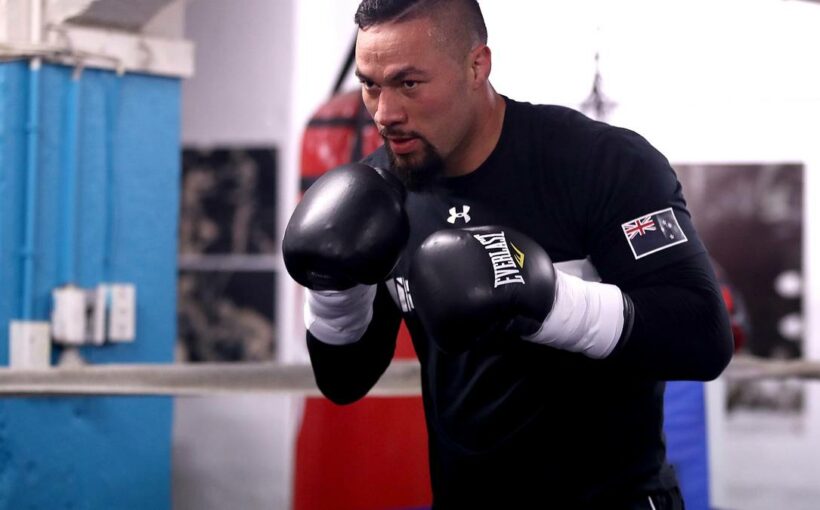Police say there was not enough evidence to criminally charge Joseph Parker and his “status and profile” did not influence the outcome of its investigation.
The champion boxer was today revealed as the top sports star police and prosecutors claimed was connected to an international drug syndicate through a series of phone messages.
The Supreme Court ordered his name suppression to expire after the fighter wanted to keep his identity hidden after prosecutors named him as allegedly linked to the group in a High Court trial during 2019.
Despite not being charged, the Crown alleged Parker played a role in the importation of methamphetamine by transporting and changing currency. The 29-year-old strenuously denies the allegations.
However, questions have been raised about the police’s investigation, with a High Court justice declaring “doubt attaches” over how thorough officers’ inquiries into the superstar were.
Today, Detective Inspector Scott Beard defended the investigation involving the Auckland City Organised Crime Unit.
“While police did find evidence that this sportsperson knew all of the men who were accused and subsequently convicted, police applied the Solicitor General’s prosecution guidelines and found that there was insufficient evidence to commence a prosecution,” Beard said.
“The status and profile of this individual did not influence the outcome of the investigation.”
Beard has earlier said Parker did not receive any “special treatment”.
He added today police carried out “a thorough investigation in a professional and fair manner” – which was reflected in the convictions and sentences imposed on five men.
Police sources have told the Herald that without any credible evidence, including a phone or proof Parker had sent messages himself, police would not charge him.
But a search warrant had been granted for Parker’s phone – which was left to expire by police.
Justice Mathew Downs, who presided over the trial, said in a decision last year “the warrant would not have been granted unless the Judge was satisfied reasonable grounds existed to suspect the commission of an offence punishable by imprisonment”.
“And there were reasonable grounds to believe the search would find evidential material in respect of that offence in the place or thing to be searched. Police did not execute the warrant. Why remains unclear,” he said.
Justice Downs added, while the police inquiry into members of the syndicate was thorough, “doubt attaches to whether the same is true of the inquiry of [Parker]”.
Today, Beard said at the time the search was to take place, Parker was not at his address and had travelled overseas.
“Police made two more attempts to visit his address and also went to a family member’s address to try to locate him,” he said.
In a sworn affidavit rejecting the allegations, Parker also appended a police jobsheet which suggested the search warrant was not executed because he was out of the country.
“However, many search warrants are executed in the absence of a possible suspect for obvious reasons,” Justice Downs said in his 2020 decision.
Parker’s lawyer Michael Heron, QC, also offered an explanation to the Court of Appeal last year.
“It is obvious why they didn’t execute the search warrant,” he said.
“[The police] had arranged for the digital forensic unit to analyse the phone. And so when they turn up and he’s not there, then the phone is not there either.”
Police had also searched for records at the foreign exchange company Travelex in relation to Parker during October 2017 but found none.
Justice Downs again questioned the police and said it was not clear whether thought was given to investigating other currency agencies.
He also said the “timing is curious” when police sought to interview Parker, who declined to be questioned, and only a week later told him he would not be charged.
Heron has said: “Whether there’s a public interest or not, it’s hard to see how he can be criticised for not speaking to police.”
Ultimately, there were two pieces of evidence prosecutors alleged at trial indicated Parker’s connection to the syndicate.
But the Crown has since recanted one of them.
Prosecutors now accept a person described as “joe” in a message describing a meeting with a California supplier is not Parker. The change came after immigration records were provided and showed the boxer was not in the United States at the time.
With the Crown pulling back on this allegation, Heron told the Court of Appeal it is “now beyond doubt there is inadequate evidence for police to charge [Parker] with aiding or abetting the defendants’ importation of methamphetamine”.
Some allegations, however, are still maintained by the Crown.
They include a message from a member of the syndicate to a Californian supplier reading: “Alright bro..I got u tho..have all ur money..the dude I was with that’s on my snapchat is going to change it to U.S currency..they won’t question him bout all the money..cause he’s the WOB boxing champion so pple know he rich anyways so he’ll be good to change it with no hassles.”
Evidence at trial from a member of the syndicate’s phone also revealed a series of Wickr messages between himself and a user called “joeboxerparker” between November 9 and 12 in 2017.
It has been accepted by Heron that joeboxerparker was his client’s Wickr address.
But Heron argued at the Court of Appeal “[a]t most … [this] evidence could be used to allege possible involvement in the recreational purchase or use of drugs”.
The court said the messages “go further than that”.
“However, it is important also to note that it is conceivable that someone other than Mr Parker was using his Wickr account,” the court’s decision read.
Source: Read Full Article

/cloudfront-ap-southeast-2.images.arcpublishing.com/nzme/JHGVMYPDT55GULP3LCCR3DGPNM.jpg)
/cloudfront-ap-southeast-2.images.arcpublishing.com/nzme/5FZH5ZT6PQX5ZVVC2K6ZFYFEC4.jpg)
/cloudfront-ap-southeast-2.images.arcpublishing.com/nzme/PHAJVWUT6V7CDGE4KA4Z3ER724.jpg)